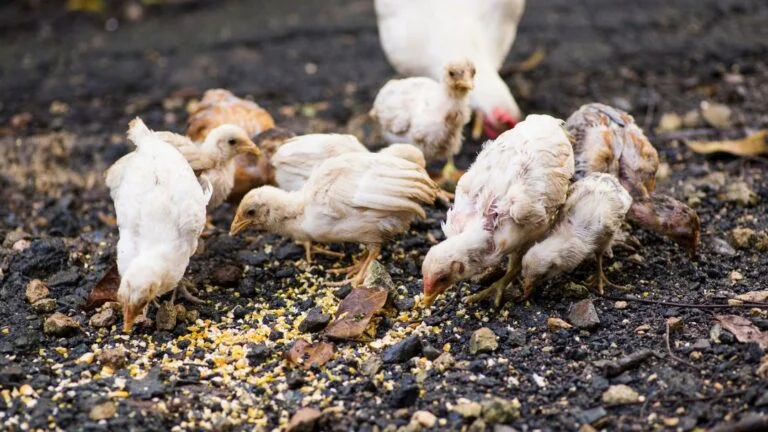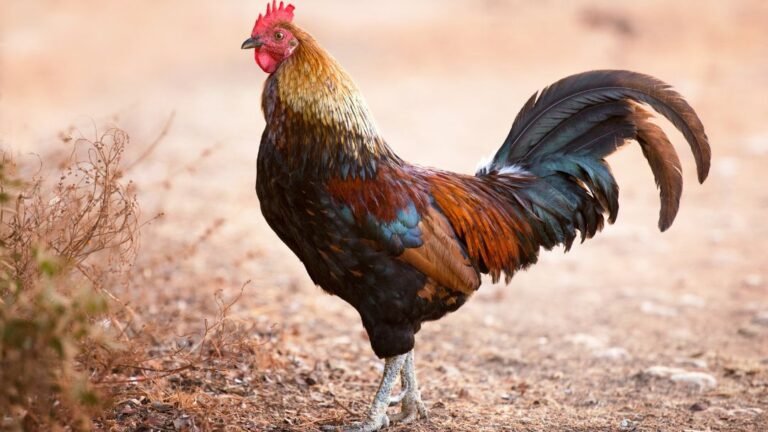Yes! Chickens can eat mango, but it is important to be aware of some considerations.
Mango is a safe and healthy treat for chickens and can provide additional nutrients to their diet. However, moderation is key as too much mango can cause digestive issues for chickens. Mangoes should be fed in small quantities and should be fully ripe to ensure they are soft and easier for chickens to eat.
The peel and pit of the mango should be removed as they can be a choking hazard. Additionally, only give chickens fresh mango as dried or preserved mango may contain additives that can be harmful to them. Overall, feeding chickens mango can be a nutritious and enjoyable treat, as long as it is done in moderation and with precautions taken.
The Relation Between Chickens And Mangoes
Chickens have a natural inclination towards fruits and vegetables, making them a great addition to their regular diet. But when it comes to specific fruits like mangoes, there are potential risks involved. It’s important to understand the relation between chickens and mangoes to make an informed decision about including this tropical fruit in their diet.
The Natural Inclination Of Chickens Towards Fruits And Vegetables
Chickens are omnivorous creatures with a keen taste for fruits and vegetables. Their diet typically consists of grains, insects, and plants, making them natural foragers. Their fondness for pecking at colorful and flavorful food is evident when they’re let loose in the garden, eagerly exploring every nook and cranny for a tasty morsel.
Fruits and vegetables provide chickens with essential vitamins, minerals, and antioxidants that boost their overall health. These nutritious treats can also be used as a way to supplement their regular feed and provide variety in their diet. While chickens tend to devour most fruits and vegetables enthusiastically, some caution is necessary when introducing certain ones, such as mangoes.
The Potential Risks Associated With Chickens Eating Certain Fruits, Including Mangoes
While mangoes are safe for chickens to eat, there are potential risks to consider. One of the main concerns with mangoes lies in their high sugar content, which can cause digestive issues in chickens if consumed in excessive amounts. Chickens have a delicate digestive system, and too much sugar can upset their balance and lead to diarrhea or other gastrointestinal problems.
Additionally, the mango pit or seed should never be fed to chickens, as it poses a choking hazard. The pit is large and can get stuck in their throat or digestive tract, causing serious health problems and potentially requiring veterinary intervention.
Factors To Consider When Deciding Whether To Feed Chickens Mangoes
When deciding whether to include mangoes in your chickens’ diet, there are a few factors to consider:
- Serving size: Limit the amount of mangoes you offer your chickens to avoid excessive sugar intake. Moderation is key.
- Freshness: Always provide ripe, fresh mangoes to ensure they are safe for consumption.
- Preparation: Remove the skin and pit before serving mangoes to your chickens. This eliminates any potential choking hazards.
- Individual tolerance: Observe your chickens closely after introducing mangoes to their diet. If any digestive issues or adverse reactions occur, it’s best to limit or discontinue feeding them mangoes altogether.
Remember, while mangoes can be a delicious and nutritious treat for chickens, it’s important to take precautions and pay attention to their individual tolerance. By following these guidelines and considering the risks associated with mangoes, you can provide your chickens with a balanced diet that includes the occasional tropical indulgence.
Nutritional Benefits Of Mangoes For Chickens
Mangoes are not only a delicious tropical fruit for humans but can also be a beneficial addition to a chicken’s diet. Before sharing this sweet treat with your feathered friends, it’s important to understand the nutritional benefits that mangoes can offer to chickens. From overall health and wellbeing to specific nutrient contributions, mangoes can be a great addition to their diet. Let’s explore the nutritional composition of mangoes and the specific nutrients that make them beneficial for chickens.
Overview Of The Nutritional Composition Of Mangoes
Mangoes are rich in various nutrients that can support the health of your chickens. They are a great source of vitamins, minerals, and antioxidants. Here is an overview of the nutritional composition of mangoes:
| Nutrients | Amount per 100g |
| Energy | 60 kcal |
| Carbohydrates | 15g |
| Protein | 0.82g |
| Fiber | 1.6g |
| Vitamin C | 36.4mg |
| Vitamin A | 1,063IU |
| Potassium | 156mg |
| Magnesium | 10mg |
Specific Nutrients In Mangoes That Are Beneficial For Chickens
Mangoes contain specific nutrients that can have positive effects on the health and wellbeing of chickens:
- Vitamin C: Chickens, like humans, lack the ability to produce their own vitamin C. Mangoes are a great source of this essential vitamin, which can help boost their immune system and protect them from common diseases.
- Vitamin A: Mangoes are also high in vitamin A, which plays a key role in maintaining healthy eyesight for chickens. It supports their vision and overall ocular health.
- Potassium: Potassium is an important mineral that helps regulate body fluids and supports muscle and nerve function. Including mangoes in their diet can help ensure chickens maintain a healthy balance of this essential mineral.
- Fiber: Mangoes contain a good amount of fiber, which can aid in digestion and promote gastrointestinal health.
How Mangoes Can Contribute To Overall Chicken Health And Wellbeing
By incorporating mangoes into a chicken’s diet, you can contribute to their overall health and wellbeing. The vitamins, minerals, and fiber found in mangoes can provide various benefits, such as:
- Enhanced Immunity: The vitamin C in mangoes can help strengthen the immune system of chickens, improving their ability to fight off infections and diseases.
- Improved Eye Health: The vitamin A in mangoes supports optimal vision and eye health in chickens, ensuring they can navigate their surroundings with ease.
- Healthy Digestion: The fiber content in mangoes aids in digestion and promotes a healthy gastrointestinal system in chickens, reducing the risk of digestive issues.
- Well-rounded Nutrition: Mangoes provide a variety of essential nutrients that contribute to the overall nutrition of chickens, supporting their growth, energy levels, and overall vitality.
Now that you are aware of the nutritional benefits that mangoes can bring to chickens, you can confidently include this tropical fruit as a healthy and tasty addition to their diet. Just remember to offer mangoes in moderation, and always provide a balanced diet that includes their main feed and access to fresh water. Your chickens will surely enjoy their new fruity treat while reaping the nutritional rewards!
Potential Risks Of Chickens Eating Mangoes
htmlMangoes are a delicious and refreshing treat for humans, but what about chickens? While it is generally safe for chickens to consume small amounts of mangoes, there are potential risks and precautions that chicken owners need to be aware of. In this section, we will explore the potential dangers of feeding chickens mangoes, the importance of moderation and proper preparation, as well as potential digestive issues that may arise.
Understanding The Potential Dangers Of Feeding Chickens Mangoes
While mangoes are packed with vitamins and nutrients that can be beneficial to chickens, there are a few potential dangers to keep in mind. First and foremost, mangoes contain a natural compound called urushiol, which is also found in poison ivy and poison oak. This compound can cause skin irritation and allergic reactions in some animals, including chickens. It is important to handle mangoes with care and avoid direct contact with the skin when feeding them to your chickens.
The Importance Of Moderation And Proper Preparation
As with any fruit or treat, moderation is key when it comes to feeding chickens mangoes. While small amounts of mangoes can provide a nutritional boost, too much can lead to digestive issues and potential health problems. It is recommended to offer mangoes as an occasional treat and not as a regular part of their diet. Additionally, make sure to remove the skin and pit before giving mangoes to your chickens, as these parts can be a choking hazard or cause blockages in their digestive system.
Potential Digestive Issues That May Arise From Feeding Chickens Mangoes
Feeding chickens excessive amounts of mangoes can lead to digestive issues such as diarrhea and upset stomach. Mangoes are a juicy fruit with a high sugar content, and an excess of sugar can disrupt the delicate balance of bacteria in a chicken’s digestive system. To prevent digestive issues, it is best to introduce mangoes gradually into their diet and monitor their response. If you notice any signs of digestive discomfort, such as loose stools or changes in appetite, it is advisable to reduce or eliminate mangoes from their diet.
Guidelines For Feeding Chickens Mangoes
Wondering if chickens can eat mangoes? The answer is a resounding Yes! Chickens can enjoy the sweet and juicy goodness of mangoes as part of their diet. However, it’s important to take certain guidelines into consideration when feeding them this tropical treat. In this article, we’ll explore recommended serving sizes for chickens based on their size and age, precautions to take when preparing mangoes for chickens, and how to mix mangoes with other foods to ensure a balanced diet.
Recommended Serving Sizes For Chickens Based On Size And Age
Chickens, like humans, have different dietary needs depending on their size and age. When it comes to serving mangoes to your feathery friends, it’s essential to provide the right amount to ensure they benefit from the nutrients without overindulging.
Here’s a handy reference table to help you determine the recommended mango serving sizes:
| Chicken Size | Age | Recommended Mango Serving Size |
|---|---|---|
| Small | Chicks to pullets (up to 16 weeks) | 1-2 small slices or 1 tablespoon of mashed mango |
| Medium | Pullets to hens (4 to 6 months) | 2-3 small slices or 2 tablespoons of mashed mango |
| Large | Adult hens (6 months and older) | 3-4 small slices or 3 tablespoons of mashed mango |
Remember, moderation is key when it comes to feeding chickens mangoes. It’s important to strike a balance between offering them this delicious fruit and maintaining a well-rounded diet.
Precautions To Take When Preparing Mangoes For Chickens
Before serving mangoes to your chickens, there are a few precautions you should keep in mind to ensure their safety and well-being:
- Thoroughly wash the mangoes to remove any dirt, debris, or pesticides that might harm the chickens.
- Peel the mangoes and remove the pit to prevent choking hazards.
- Cut the mangoes into small, bite-sized pieces or mash them to make it easier for chickens to eat and digest.
- Avoid adding any seasonings, such as salt or spices, as these can be harmful to chickens.
- Introduce mangoes gradually into their diet to ensure they tolerate it well and do not experience any adverse reactions.
Mixing Mangoes With Other Foods To Ensure A Balanced Diet For Chickens
While mangoes offer nutritional benefits with their high vitamin and mineral content, it’s important to remember that they should not replace a varied and balanced diet for chickens. Mixing mangoes with other foods can help ensure they receive all the nutrients they need. Here are some ideas for mixing mangoes with other chicken-friendly foods:
- Add diced mangoes to their regular feed for a fruity twist.
- Mix mashed mangoes with plain yogurt for a creamy and nutritious treat.
- Create a fruit salad with mangoes, berries, and watermelon for a refreshing summertime snack.
- Incorporate diced mangoes into homemade chicken treats, such as oatmeal bars or muffins.
By combining mangoes with other foods, you can create a diverse and well-balanced diet that supports optimal health and egg production in your chickens.
Alternatives To Mangoes For Chickens
Mangoes are a delicious treat for humans, but can chickens enjoy them too? The answer is yes! However, it’s important to be aware of a few factors before feeding mangoes to your feathered friends. If you’re looking for other fruits and vegetables to diversify your chicken’s diet or your chickens aren’t fans of mangoes, there are plenty of safe, beneficial alternatives available. By considering individual preferences and availability, you can ensure that your chickens enjoy a well-rounded and nourishing diet. Let’s explore some of the best options!
Other Fruits And Vegetables That Are Safe And Beneficial For Chickens To Eat
When it comes to feeding your chickens a varied diet, there are many fruits and vegetables that can be both safe and beneficial for them. Here are some options to consider:
1. Apples
Apples are a fantastic choice for chickens as they are packed with vitamins and minerals. Make sure to remove the seeds and core before feeding apples to your birds.
2. Berries
Strawberries, blueberries, and raspberries can be wonderful treats for chickens. These antioxidant-rich fruits can provide a burst of flavor and a nutritious boost to their diet.
3. Leafy Greens
Leafy greens such as spinach, kale, and lettuce are excellent sources of essential nutrients like calcium and iron. Chickens enjoy pecking at these leafy delights.
Exploring Different Options To Diversify The Chicken’s Diet
Diversifying your chicken’s diet not only adds variety but also ensures they receive a balanced range of nutrients. Consider including the following options to expand their culinary experiences:
1. Pumpkins
Pumpkins are not only a festive decoration but also a nutritious treat for chickens. They are a great source of vitamins and can help keep their digestion healthy. Feed them pumpkin seeds too for an extra dose of protein.
2. Carrots
Carrots are packed with beta-carotene, which is beneficial for both chickens’ immune systems and their feather health. Crispy and sweet, these orange veggies are sure to be a hit.
3. Peas
Peas are not only a tasty treat but also contain protein, vitamins, and minerals. Fresh or frozen peas can be a delightful addition to their diet.
Considering Individual Preferences And Availability When Selecting Alternatives
Each chicken may have its own preferences when it comes to food. Some may eagerly peck at every fruit and vegetable offered, while others may be more selective. Additionally, the availability of certain options may vary depending on the season or your location. To ensure a happy and well-fed flock, pay attention to their individual tastes and factor in what’s readily accessible for you. It’s all about finding the right balance.
By exploring a range of fruits and vegetables that are safe and nutritious for chickens, you can provide a varied and enjoyable diet for your feathered companions. Remember to introduce new foods gradually and observe any potential allergic reactions. With a diverse menu, your chickens will thrive and enjoy the benefits of a well-rounded diet!
Conclusion
To sum it up, chickens can indeed enjoy the delicious tropical treat of mangoes, but it’s important to exercise caution in their consumption. While small amounts can be a healthy addition to their diet, ensure you remove the skin and pit to prevent any choking hazards.
Remember, moderation is key when introducing any new food to your feathered friends. Keep your chickens happy and healthy with a well-balanced diet that includes a variety of treats, including mangoes!



